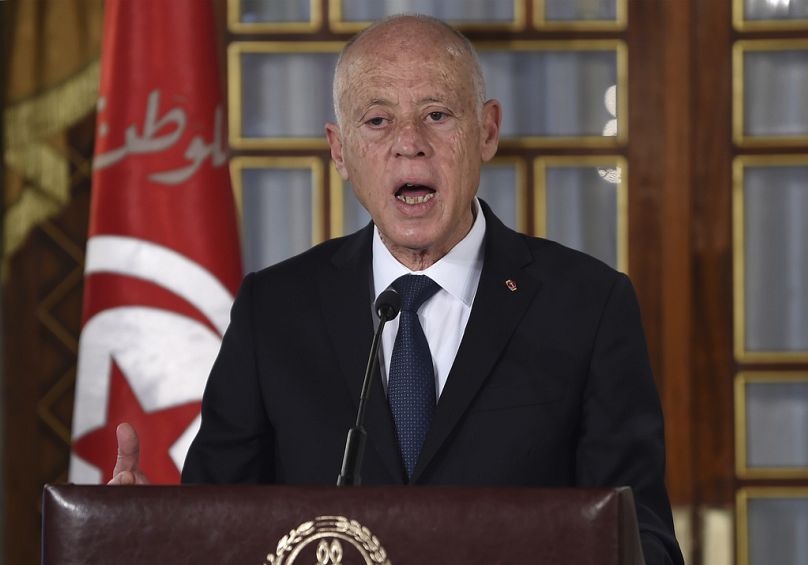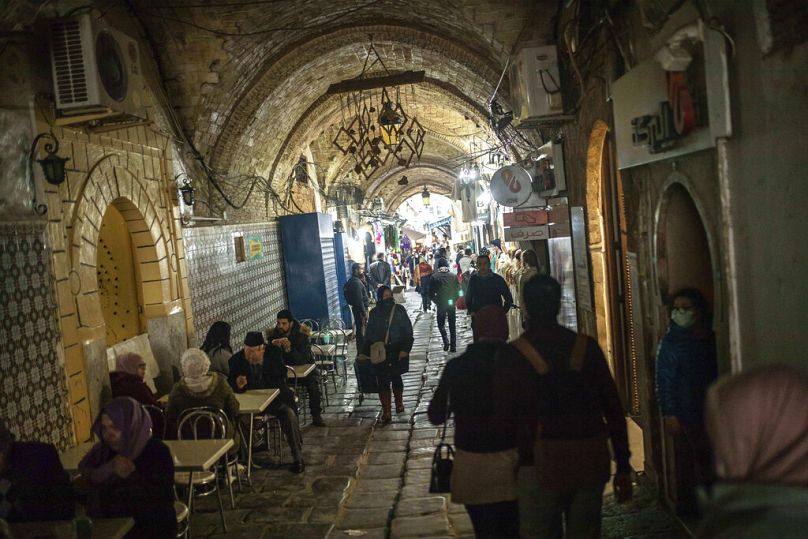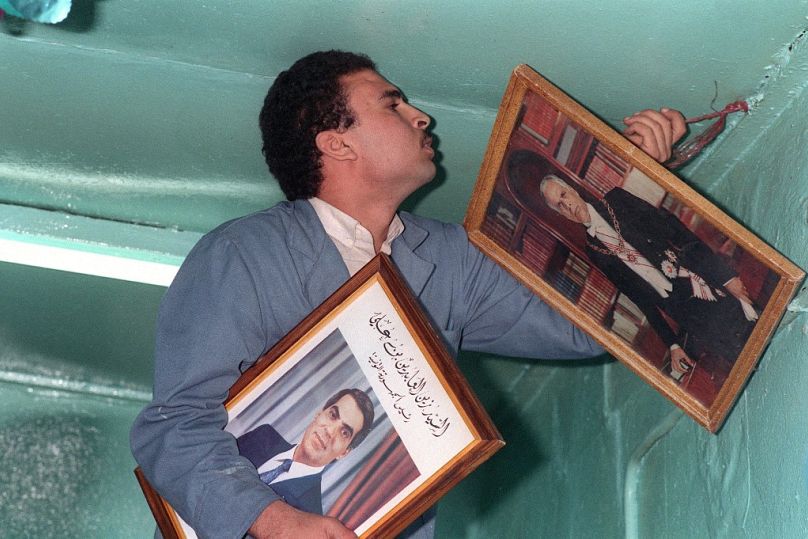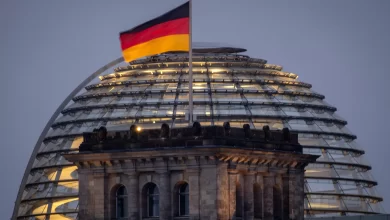Euroviews. Tunisia must break free from reliance on short-term economic fixes
The opinions expressed in this article are those of the author and do not represent in any way the editorial position of Euronews.

Tunis’ political decision to mobilise resources for escalating expenditures without addressing the need to curb spending, downsize the government, and reduce the state’s economic footprint is a looming disaster, Sadok Rouai writes.
Tunisian President Kaïs Saïed recently declared that central bank autonomy should not equate to independence from the state.
Saïed insisted that autonomy applies to monetary policy but not the financing of the state budget. This comes in the wake of the recent postponement of the IMF mission to discuss the monetary fund’s deal for Tunisia.
President’s declaration against the Central Bank’s autonomy has marked the apex of a series of assaults on its sovereignty, aimed at overturning Article 25 of its current statute which prohibits direct financing of the state budget.
The bank’s governor, Marouane El Abassi, had previously warned that central bank financing of the budget would spike inflation uncontrollably and replicate the Venezuelan scenario in the country.
But what motives underlie Saïed’s unsettling efforts to overturn Article 25?
Populist rejection to consolidate one-man rule
More than a year has passed since Tunisia inked a $1.9 billion (€1.73bn) preliminary agreement with the IMF, led by then-Head of Government Najla Bouden’s economic team on 15 October 2022.
The agreement targeted financial imbalances through measures like cutting untargeted subsidies, trimming the public sector wage bill, and reforming loss-making public enterprises.
Saïed’s populist rejection of the IMF deal, citing it as a tool of Western imperialism, follows his moves to consolidate one-man rule since September 2021.
Governing Tunisia unilaterally through decrees, bypassing the constitution, and suppressing critics, Saïed has overseen a worsening economic crisis marked by growing poverty, essential item shortages, and soaring prices.
He considers that implementing IMF reforms could trigger protests, posing a challenge to his political control.
The commitment to implement crucial reforms for the finalisation of the IMF deal has therefore been long delayed.
This resistance escalated further with Saïed’s recent sacking of the minister of economy and planning, who had spearheaded the IMF negotiations and remained committed to the implementation of the agreed reforms.
A quick fix won’t do
In the interim, faced with limited access to foreign financing, the authorities have heavily leaned on local funding, particularly from the banking system.
They accumulated arrears with both foreign and local suppliers. Tunisia thus experienced a significant decline in imports and distribution of subsidized commodities, leading to frequent shortages.
Local banks face a capacity limit to finance the state budget, prompting calls to push the Central Bank to do so. This is a red alert — Tunisia must break free from reliance on short-term fixes at this perilous juncture.
Bilateral donors must vigorously support systemic economic reforms and Central Bank sovereignty within an IMF deal. There’s no alternative path for Tunisia’s economic future.
Advocates proposing amendments to the Central Bank’s statute argue that reintroducing direct budget financing if within legal limits, would be sustainable and minimally impact inflation.
They contend that such financing would eliminate intermediation costs imposed by the banking system.
However, this perspective overlooks the risk of potential abuses and misuse of the law, offering a convenient yet temporary solution for the government.
The political decision to mobilise resources for escalating expenditures without addressing the need to curb spending, downsize the government, and reduce the state’s economic footprint is a looming disaster.
History does repeat itself
Tunisia’s own economic history should serve as a cautionary tale against compromising the Central Bank’s independence.
In the early 1980s, populist economic mismanagement led to a surge in the budget deficit from 2.8% of GDP in 1980 to 8.1% in 1983.
Much as what we are witnessing today again in the country, the state favoured convenient shortcuts over the necessary but challenging structural reforms.
Starting in 1982, Tunisia’s then-minister of finance and planning asked the Central Bank Governor to execute a series of accounting transactions that would provide direct financing to the Treasury beyond the confines of the budget. These transactions amounted to 5.8% of the GDP at the end of 1983.
By the late 1980s, this approach proved short-sighted and a failure, and Tunisia in the end had to resort to the IMF for assistance in addressing its financial imbalances.
Despite initial efforts to safeguard the Central Bank’s independence, there has been ongoing interference, marked by a high turnover of governors prematurely relieved of their duties. Initially stable with three governors serving for 22 years from its establishment in 1958 until the 1980s, subsequent appointments — excluding the current one — have seen seven out of ten governors removed prematurely due to political considerations.
Tunisia’s government has to see the light
Bilateral donors must underscore the imperative of preserving the independence of the Tunisian Central Bank and advancing its modernisation, alongside crucial negotiations for an IMF deal.
The prohibition on direct Central Bank financing to the budget has been in place since 2006. For Tunisia to move backwards and invoke policies that proved to be clear failures in the 80s, is to send the country’s fragile economy reeling into freefall.
Tunisia’s Central Bank has made notable progress in transparency, but further improvements are needed.
These include preventing government representatives from joining its Board and establishing clear criteria for the appointment and dismissal of its governor and directors, adhering to legal deadlines for annual report publication, engaging external experts for policy evaluations (as seen in successful initiatives in England, Australia, Ireland, Chile, Spain, and elsewhere), making archives accessible to researchers, and announcing significant decisions through press conferences.
The inevitability of structural economic reforms in Tunisia today is crystal clear.
As the country’s parliament just recently adopted the 2024 budget, the timing of this discourse is opportune. Bilateral donors and multilateral institutions must persist in encouraging Tunisia to engage in meaningful negotiations with the IMF and to safeguard the independence of its institutions.
Tunisia’s economic future hangs on it.
Sadok Rouai is a former Senior Advisor to the Executive Director of the IMF and former Head of the Banking Supervision Department at Tunisia’s Central Bank.
At Euronews, we believe all views matter. Contact us at [email protected] to send pitches or submissions and be part of the conversation.






